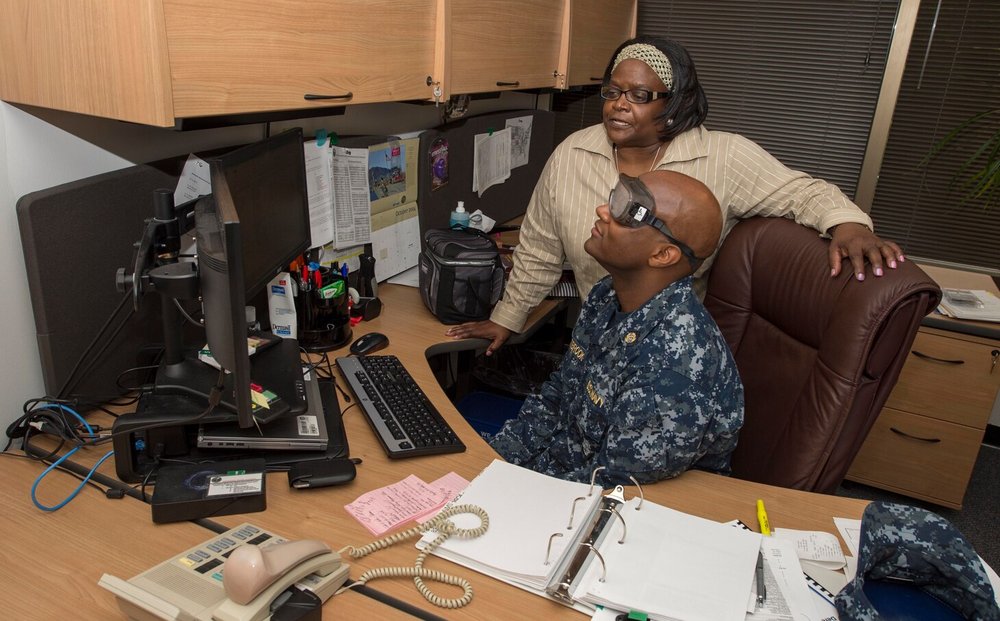Cmdr. Ed Westbrook participates in an National Disability Awareness Month exercise
SILVERDALE, Wash. (NNS) -- Navy Region Northwest Sailors and civilians participated in a National Disability Awareness Month exercise at Naval Base Kitsap, Bangor Oct. 7-9.
Navy Region Northwest along with Naval Facilities Engineering Command Northwest (NAVFAC) combined forces to develop unique, real-life disabilities for participants who were randomly given one of three selected disabilities including mobility, hearing and eyesight."Military and civilian employees of the selected commands were given the opportunity to experience a disability first-hand," said Judy Conlow, from NAVFAC and a coordinator for the event. "They were encouraged to explain how they felt and how they were treated."
The exercise was a tool for coordinators to evaluate the base's access for those with disabilities. It also gave participants ideas for ways to better the workplace. "As an architect this exercise will be a great tool in utilizing what needs to be done to make Naval Base Kitsap more prone for those who are disabled," said Cmdr. Nick D. Yamodis, NAVFAC operations officer.
Yamodis, Cmdr. Edward K. Westbrook II, Navy Region Northwest judge advocate and Navy Region Northwest Command Master Chief Todd Gruchalla volunteered for the exercise and had to perform specific tasks with their respective disabilities.
"I think it's a worthwhile cause," said Westbrook. "A disability is a life changer and today I'm going to have to make adjustments to comply with my temporary disability."
Yamodis was selected for the mobility disability which required him to spend part of his workday in a wheelchair to perform some of his daily activities including using the restroom, attending a meeting and going to lunch. According to Yamodis, the most difficult task was opening and transiting through doorways.
"The doors closed really hard," said Yamodis. "Trying to maneuver in the chair while trying to get through a door with it constantly wanting to shut was difficult."
Quick closing doors were not the only things Yamodis experienced.
"I learned a lot of different things," he said. "Subtle things such as height of the railings, sinks and soap dispensers in the restrooms and allotted space in offices. It makes you pause and think about how to make things better."
As for Westbrook, he received a loss of sight disability. This disability required Westbrook to don goggles that blocked out his vision. He was given a walking cane to help him maneuver about. Among his tasks, Westbrook had to attend a meeting featuring a slideshow brief, walk from his vehicle in the parking lot to his office space, log into his computer and have an office teammate read him an email. Westbrook depends on the use of his eyesight for looking at instructions and statutes in the Uniform Code of Military Justice (UCMJ).
"Being in my office, nothing is in braille," said Westbrook. "Our software has disability functions, but none of them are enabled and if they were, I don't know how to use them."
The inability to adequately perform his job was but one of the challenges Westbrook faced.
"While I was in the meeting, I realized how much I took my eyes for granted," he said. "Needing your eyes to be able to see facial expressions or read body language, by not having sight it was hard to understand if people were agreeing or not."
Gruchalla was given a hearing disability. The hearing disability required Gruchalla to wear double hearing protection to block out as much noise as possible to simulate being deaf.
"I had earplugs in covered with soundproof headphones," said Gruchalla. "I couldn't hear a thing."
As Command Master Chief, Gruchalla interacts with many Sailors on a daily basis. With the inability to hear conversations Gruchalla needed to make the necessary adjustments.
"During the meeting I would look at the person speaking," said Gruchalla. "I would do my best in trying to comprehend what they were saying; reading their lips."
Following the meeting, Gruchalla was required to simulate a conference call. "I had a tough time using the phone I have in my office," he said. "We definitely need to have hearing impaired phones or else someone who actually has this impairment will have a difficult time."
As the region wrapped up its disability awareness exercise Gruchalla said he looks forward to continuing Navy Region Northwest's efforts in making its bases more accessible for those impaired with a disability. "
It's a great idea," he said. "People with disabilities bring great value to any organization." According to Conlow, the event was a success and she was pleased with the results.
"The coordinators from NAVFAC and the region were very pleased with the outcome," said Conlow. "We plan to share the experience of a few with all members of their commands during Disability Awareness Month events."
